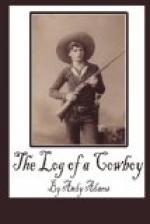“‘Is that a bluff, or do you mean it for a real play?’ I inquired, politely.
“‘You’ll find that it will be real enough,’ he answered, angrily.
“‘Well, now, that’s too bad,’ I answered; ’I’m really sorry that I can’t promise to respect your request. But this much I can assure you: any time that you have the leisure and want to shoot me, just cut loose your dog. But remember this one thing—that it will be my second shot.’”
“Are you sure you wasn’t running a blazer yourself, or is the wind merely rising?” inquired Durham, while I was shuffling the cards for the next deal.
“Well, if I was, I hung up my gentle honk before his eyes and ears and gave him free license to call it. The truth is, I didn’t pay any more attention to him than I would to an empty bottle. I reckon the girl was all right, but the family were these razor-backed, barnyard savages. It makes me hot under the collar yet when I think of it. They’d have lawed me if I had, but I ought to have shot him and checked the breed.”
“Why didn’t you run off with her?” inquired Fox, dryly.
“Well, of course a man of your nerve is always capable of advising others. But you see, I’m strong on the breed. Now a girl can’t show her true colors like the girl’s brother did, but get her in the harness once, and then she’ll show you the white of her eye, balk, and possibly kick over the wagon tongue. No, I believe in the breed—blood’ll tell.”
“I worked for a cowman once,” said Bull, irrelevantly, “and they told it on him that he lost twenty thousand dollars the night he was married.”
“How, gambling?” I inquired.
“No. The woman he married claimed to be worth twenty thousand dollars and she never had a cent. Spades trump?”
“No; hearts,” replied The Rebel. “I used to know a foreman up in DeWitt County,—’Honest’ John Glen they called him. He claimed the only chance he ever had to marry was a widow, and the reason he didn’t marry her was, he was too honest to take advantage of a dead man.”




